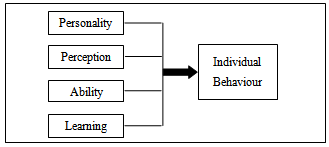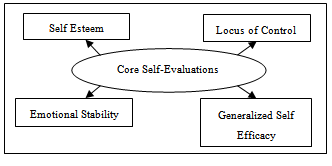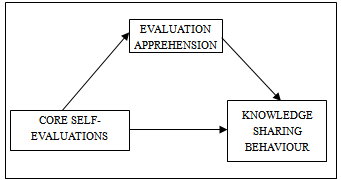-
Paper Information
- Next Paper
- Previous Paper
- Paper Submission
-
Journal Information
- About This Journal
- Editorial Board
- Current Issue
- Archive
- Author Guidelines
- Contact Us
International Journal of Applied Psychology
p-ISSN: 2168-5010 e-ISSN: 2168-5029
2013; 3(1): 13-18
doi:10.5923/j.ijap.20130301.03
Towards an Understanding of the Effect of Core Self-Evaluations and Knowledge Sharing Behaviour
Khairulbahiyah Yaakub , Roziana Shaari , Siti Aisyah Panatik , Abdul Rahman
Faculty of Management and Human Resource Development, Universiti Teknologi Malaysia, Skudai, 81310, Johor, Malaysia
Correspondence to: Khairulbahiyah Yaakub , Faculty of Management and Human Resource Development, Universiti Teknologi Malaysia, Skudai, 81310, Johor, Malaysia.
| Email: |  |
Copyright © 2012 Scientific & Academic Publishing. All Rights Reserved.
The journey to inculcate and establish knowledge sharing behaviour in organizations remains incomplete. Across all of the studies on knowledge sharing, behaviour stood out as a significant variable. Knowledge sharing behaviour among individuals were assumed to be influenced by personality trait. This paper reviews previous studies in order to provide a framework for understanding on how personality trait, specifically core self-evaluation influence knowledge sharing behavior. Personality has been found to be useful in predicting behavioural outcomes in knowledge sharing. Therefore, this study aims to discuss the effect of core self-evaluations on knowledge sharing behavior. Additionally, this study also discusses the role of evaluation apprehension as a mediator in the relationship between core self-evaluation and knowledge sharing behavior among employees. The paper concludes with a general discussion of the future research directions and practical implications of knowledge sharing research, especially to the librarian academics.
Keywords: Knowledge Sharing Behaviour, Personality Traits, Core self-evaluations, Evaluation Apprehension, Academic Librarian
Cite this paper: Khairulbahiyah Yaakub , Roziana Shaari , Siti Aisyah Panatik , Abdul Rahman , Towards an Understanding of the Effect of Core Self-Evaluations and Knowledge Sharing Behaviour, International Journal of Applied Psychology, Vol. 3 No. 1, 2013, pp. 13-18. doi: 10.5923/j.ijap.20130301.03.
Article Outline
1. Introduction
- In the current economy, knowledge stands out as an intellectual asset that provides a competitive advantage. From the perspective of economic models, knowledge is desirable in decision-making and critically contributes to production through competence and innovation. Thus, knowledge deserves the attention of specific interventions in the sense that it does not lose its value but increases with use. Companies typically focus on knowledge creation by employing knowledge workers and creative thinkers, and inculcating a learning environment for future survival. Reference[1] has established a list of top-ten rules for organizational survival, with “managing knowledge” as the number one rule. The most challenging part in managing knowledge is knowledge sharing[2]. Organisational culture[3], trust , incentives and rewards[2] and information technology[4] have been identified as factors that capacitate and stimulate knowledge sharing behaviour only in the early stages. Humans are complex and unique creatures whose behaviour changes according to self-interest. Therefore, the point of origin for change lies in the individual who must be motivated to share because he/she is the originator, transferor and user of knowledge[5]. Numerous researchers have focused on individual factors as predictors to
2. Theoretical Background and Literature Review
- This research investigates the involvement of positive personality factors that influence the behaviour to share. Knowledge sharing is a sensitive behaviour that combines both emotional expression and behavioural reaction[12]. Logically, positive emotions may act as an intrinsic motivation that makes knowledge sharing more interesting and fun[13] . However, factors affecting the readiness and willingness to share remain uncovered, and inspiring individuals to share remains a major challenge. To this end, the Social Cognitive Theory and the Cognitive Dissonance Theory are applied.
2.1. Social Cognitive Theory
- Social Cognitive Theory is based on Social Learning Theory. It involves a dynamic interplay among personal determinants, behaviour and environmental influences[14]. This theory clarifies how conceptions, beliefs, self-precepts and aspirations lead to the formation of a certain behaviour. Rationally, an individual who possesses positive personal determinants would portray positive behaviours. For example, mountaineering is a high-risk sport that is associated with extreme physical endurance and hardships. But what makes a mountaineer still eager to climb? Obviously, without strong personal determinants, an individual would not have the courage to engage in such risky behaviour. The key factors that influence individual behaviours are personality, perception, ability and learning[15] as shown in Figure 1.
 | Figure 1. Individual behaviour: key influential factors |
 | Figure 2. Core Self-Evaluations |
2.2. Cognitive Dissonance Theory
- Another theory that explains the relationship between individual factor and knowledge sharing behavior is the cognitive dissonance theory. The theory of cognitive dissonance by Festinger (1957) focuses on the important psychological processes of individuals, specifically on the connections among cognitions that form the elements of knowledge that individuals have about their behaviours, attitudes, perceptions, beliefs and environments. Cognitive refers to thought, attitudes, beliefs and behaviours which the individual is aware of. Dissonance refers to an unpleasant state of tension or arousal. When experiencing dissonance, an individual will try to reduce or escape this uncomfortable feeling by changing one’s behaviour or attitude. We rely on the theory of cognitive dissonance to explain the state of evaluation apprehension in our investigation. Cognitive dissonance, in our research context, exists when a person has two contradictory cognitions: to share or not to share knowledge. Evaluation apprehension has been defined as an individual’s “active anxiety-toned concern” that one may be evaluated negatively[24]. The feelings of anxiety become greater as one becomes more aware of others. We feel distracted and worried about our performance. Evaluation apprehension has been revealed to have a negative effect in several situations including learning performance[25], communication[26] and task performance[27]. Personal competence and confidence are the major requirements for an individual to engage in knowledge sharing. However, evaluation apprehension may reduce one’s confidence level and restrain the intention of sharing[11]. It is owing to the existence of fear that one’s knowledge or idea could be evaluated or critiqued that one’s knowledge sharing behaviour is inhibited. Evaluation apprehension may result from the perception that knowledge sharing is irrelevant or worthless to others in terms of quality and usefuless, and will draw reviews, assessments and criticism from others[28]. According to reference[29], cognitive dissonance also arises when there is inconsistency between what individuals already know or believe and new information received. Most likely, individuals refuse to accept new incoming knowledge that may require them to discard the existing ones. In some cases, knowledge hoarding occurs within virtual knowledge sharing communities when members are more anxious of being criticized as what they posted online may mislead others[30] and ‘fear to lose face’[31].In normal situations, we tend to sustain our behaviour if the surroundings are safe and will not cause negative consequences or punishment. Besides, we feel honoured and willing contribute when we receive appropriate feedback and perceive that we are actually helping others. However, if we notice that nobody buys our ideas, we might withhold our knowledge. Therefore, being evaluated may cause pressure and dissatisfaction towards knowledge sharing. Thus we propose that low level of evaluation apprehension will increase knowledge sharing behavior. Previous research has also proven that coreself-evaluations have a positive effect on cognitive ability[32]. We predict that individuals with high core self-evaluations will have a strong cognitive ability capable of overcoming dissonance. Furthermore, individuals with high core self-evaluations tend to be more stable, believe in their own agency[33] and be able to perform tasks more consistently. Individuals with a positive view of themselves are able to face criticism and accept feedback more effectively [34]. They are affected less by negative evaluations and are able to face risks[17]. Logically, individuals with a positive outlook will perform confidently, believe in their capabilities to face any obstacles and eliminate defensive behaviours[35]. Positive personality traits such as trust[36] and openness[37] are likely to be more influenced by anxiety and tend to withdraw from knowledge sharing behaviour[10]. They are afraid of being critiqued and evaluated by others. In our context, it is expected that high core self-evaluations will reduce evaluation apprehension and increase one’s motivation in sharing knowledge. Thus, we propose that high core self-evaluations will decrease the level of evaluation apprehension.As we investigate the possible relationship between core self-evaluations and knowledge sharing behaviour, we predict evaluation apprehension to be an obstacle. Hence evaluation apprehension will act as the mediating variable in this relationship (see Figure 3). Reference[38] describes a mediator as a variable that fully or partially accounts for the relation between an independent variable and a dependent variable, thus revealing why the variables are related. In this study, the motivation to share knowledge will depend on the level of evaluation apprehension. Under low evaluation apprehension, knowledge sharing behaviour will be positively exhibited while the reverse will occur under high evaluation apprehension. This study will investigate core self-evaluations and knowledge sharing behaviour with evaluation apprehension as a mediator, in an effort to understand what leads to the enhancement of knowledge sharing behaviour.
 | Figure 3. A Conceptual Framework |
3. Methodology
3.1. Population & Sample
- The population for this study will comprise of academic librarians from five research universities in Malaysia namely Universiti Teknologi Malaysia, Universiti Sains Malaysia, Universiti Malaya, Universiti Kebangsaan Malaysia and Universiti Putra Malaysia. All participants are qualified professional librarians with grades VU7, S54, S52, S48, S44 and S41. The population consists of Head of Librarians, Deputy Chief Librarians, Head of Departments, Senior Officers and Officers. Librarians value the importance of knowledge sharing[39] and are aware that it is imperative for libraries to promote innovation activities through knowledge sharing. Typically, academic librarians are focal inpreserving and developing knowledge that sustains research activities for the university. Hence, they work on transforming their relationship with faculty members through collaboration and facilitating networking by integrating information technology[40]. In order for university libraries to remain relevant and competitive, management ought to encourage librarians to share their knowledge and ideas.
3.2. Data Collection
- The total population of academic librarians in public universities in Malaysia is six hundred and thirty-five. Based on[41], a representative sample size for this study is two hundred and forty-two. Therefore, two hundred and fourty two questionnaires will be distributed. The instrument will be examined to ensure content validity and reliability within the target context. A pretest of the questionnaire will be performed to assess logical consistencies, ease of understanding, question item sequence adequacy and context fitness.
3.3. Construct Measurement
- The items used to measure knowledge sharing behaviour as dependent variables are adapted and modified from [42-44]. The instrument consists of fourteen (14) questions and use five-point Likert-type scales (strongly disagree to strongly agree). Meanwhile, the instrument to measure core self-evaluations is adapted from[33] which is a 12-item inventory that measures a single factor using five-point Likert-type scales (strongly disagree to strongly agree). These items will include statements about typical thoughts and feelings such as “I am confident I get the success I deserve in life”, and behaviours such as “I complete tasks successfully”. Evaluation apprehension items are adapted and modified from[45] to measure communicationapprehension, and from[46] to measure writing apprehensions. This instrument also uses a five-point Likert-type scale (strongly disagree to strongly agree). These items will include statements such as “I am afraid of sharing my knowledge because my contribution may be critiqued” and “I would worry about being negatively evaluated if I shared my knowledge”.
4. General Discussion and Conclusions
- This study seeks to identify how core self-evaluations affect knowledge sharing behaviour among academic librarians. In addition, we will investigate if core self-evaluations could reduce evaluation apprehension, thus enhancing knowledge sharing behaviour. Previous research suggested that the broad personality concept such as core self-evaluations may contribute to our understanding of knowledge sharing. It would be interesting to investigate if core self-evaluations influence knowledge sharing through influencing perception of the usefulness of knowledge sharing and reducing evaluation apprehension. We found in our review of the literature that researchers have investigated the direct relationship between personal characteristics and knowledge sharing. However, there is still limited study on evaluation apprehension as mediator in the relationship between core self-evaluation and knowledge sharing behavior. Thus, the study will contribute to the current body of knowledge and make a positive impact on the librarianship profession. Academic librarians face increasing challenges and pressures in the university environment. They have to be aware of and cast the vision of their future role as key players in tomorrow’s academia.
ACKNOWLEDGEMENTS
- We would like to express special thanks to the School of Graduate Studies, Universiti Teknologi Malaysia and the Faculty of Management and Human Resource Development for their support in this study.
 Abstract
Abstract Reference
Reference Full-Text PDF
Full-Text PDF Full-text HTML
Full-text HTML